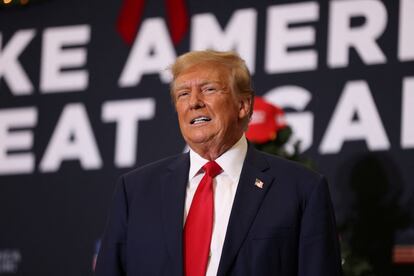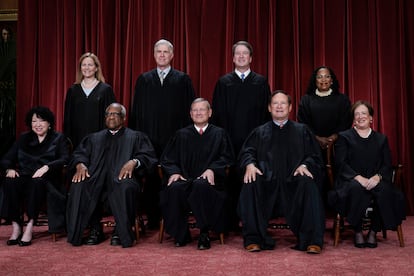Trump’s chances of returning to the White House rest in the hands of the Supreme Court
The top tribunal must decide whether the 14th Amendment — which bans an ‘insurrectionist’ from running for public office — can be applied to a president


The Colorado Supreme Court’s decision to prevent Donald Trump from running in the Republican primaries in Colorado caused a shock wave on Tuesday, but it is far from being the last word in the legal debate about whether the former president may or may not run in the November 2024 elections.
Firstly, because the ruling — which found that Trump took part in an “insurrection” during the attack on the Capitol on January 6, 2021, and was therefore banned under the 14th Amendment of the Constitution — means just that: that Trump’s name cannot appear on the ballots in Colorado, a state that voted Democratic in 2016 and 2020. But above all, because that last word, like so many in this country, lies with the U.S. Supreme Court in Washington.
The Colorado judges, in a narrow 5-4 decision, gave the former president’s lawyers until January 4 to appeal the decision to the Supreme Court, and they immediately confirmed that they would do so. A few hours later, the attorneys asked the Supreme Court to hold off on deciding another pending issue: whether Trump enjoys presidential immunity from criminal prosecution.
The nine Supreme Court justices — three liberals and six conservatives, three of whom were appointed during the Republican magnate’s tenure — may decide not to intervene, but it is highly unlikely. “It’s almost impossible to believe that the Supreme Court will not accept this case,” Paul Collins, professor of Law and Political Science at the University of Massachusetts Amherst, and the author of several books on the Supreme Court, explained by email on Wednesday. “It addresses a matter of exceptional importance, and the question of whether the 14th Amendment’s disqualification clause applies to presidents is a question that has not been answered by the Supreme Court before.”

To be eligible to run for the White House, a candidate must be a U.S. citizen, be over 35 years old and have resided in the country for the last 14 years. The U.S. Constitution does not expressly prohibit a person charged with a federal crime (Trump faces 94 counts, in four different cases) from being president. Not even if that person is found guilty.
But the 14th Amendment, passed in 1868, contains Section 3, which was drafted after the Civil War so that Southern rebels could not reoffend from within the system by running for office. Known as the “disqualification clause,” it reads: “No person shall be a Senator or Representative in Congress, or elector of President and Vice-President, or hold any office, civil or military, under the United States, or under any State [...] who, having previously taken an oath [...] to support the Constitution of the United States, shall have engaged in insurrection or rebellion against the same, or given aid or comfort to the enemies thereof.”
An act of rebellion
On whether Trump’s actions on January 6, 2021, when he called a rally in Washington that ended in the assault on the Capitol, could be considered an act of insurrection, the Colorado Supreme Court had no doubts. Its strong-worded ruling said that Trump could be considered an insurrectionist, adding that his fiery diatribe that inflamed his support was not protected by the First Amendment, which guarantees free speech. And late Wednesday morning, President Joe Biden agreed. “He certainly supported an insurrection,” he told journalists. “No question about it. None. Zero.”
The ruling from the Colorado Supreme Court also found that this ban can be applied to presidents. This goes against the decision of Judge Sarah Wallace, who handed down the ruling of a lower court that was appealed, and the arguments of Trump’s lawyers, who claim that the president is not an officer of the United States and that his oath to “preserve, protect and defend the Constitution” is not the same as the oath to “support” it, as described in the 14th Amendment.
For Collins, who believes the long majority opinion released on Tuesday was “very well reasoned,” the most likely outcome is that the “Supreme Court puts Trump’s name back on the ballot in Colorado.” “They can do this in a few different ways,” he explains. “For instance, they could find that the 14th Amendment does not apply to the president. They could find that removing someone from a presidential ballot requires a criminal conviction. They could find that this is a political question that courts should not decide.” What is clear, he adds, is that, in the unlikely event that the Supreme Court rules against the former president, it does not have the power to “take Trump off the ballot in all 50 states.” “If they determine that states have the power to do this, it would need to happen on a state by state basis,” he explains.
But if the Supreme Court rules that the decision was wrong, this would have nationwide effects.
The Colorado Supreme Court’s decision is still a source of concern for Trump, as it sets an example that could be followed by states that are more decisive in the 2024 election. If enough states refuse to put Trump’s name on the ballot, it could be mathematically impossible for him to gather enough electoral votes — this would be tantamount to disqualifying him. At the moment, there are similar cases open in Maine, Michigan and Oregon. While in Minnesota and New Hampshire, efforts invoking the same clause have failed in court, due to procedural or jurisdictional issues.
“The fact that one state court has seen fit to rule this way suggests that the logic could be strong enough for this to happen,” presidential historian Russell Riley said in statements to EL PAÍS. “That logic is simple: anyone shown to be cavalier with the oath of office should not be entrusted to abide by that solemn oath in the future.”
Riley — co-director of the Miller Center at the University of Virginia in Charlottesville — said that the United States was entering “uncharted waters,” a phrase heard repeatedly in analyses of the case in Colorado. “There is no known precedent.”
But analysts have pointed out one: the Supreme Court ruling in Bush vs Gore, which settled the dispute over the recount of votes in Florida in the 2000 elections and ended up giving the presidency to George Bush Jr. “These are both very significant cases that have potentially enormous political consequences,” says Collins. “Bush v. Gore clearly illustrated just how partisan and ideological the Supreme Court can be, and this case is likely to have a similar partisan result. Interestingly, the court was able to restore much of its public support after Bush v. Gore. With its current public approval ratings at an all-time low, it will be fascinating to see how this affects the legitimacy of the court in the eyes of the public.”
In addition to its low public approval, most of the justices on the Supreme Court are known for interpreting the Constitution as faithfully as possible, so it will be interesting to see how they do so in this case. Interestingly, the legal theory behind Colorado’s ruling also comes — like some of Washington’s most famous justices — from the “originalism” camp, which advocates sticking as closely as possible to the U.S. Constitution, which was written more than two centuries ago. That legal theory began to gain traction in August, following the circulation of a 126-page scholarly article for the University of Pennsylvania law review. It was signed by William Baude and Michael Stokes Paulsen, two renowned conservative academics.
After learning of the court ruling, Trump held a rally in Iowa, the state where the Republican primaries will kick off in January. He did not speak about the Colorado ruling, but he did allude to it in a message on his social network Truth Social. “A sad day for America!!!” he posted, in all capital letters. In a fundraising letter, he added: “This is how dictatorships are born. I will not let left-wing judges STEAL the votes of a MAJORITY of Americans.” Trump has been using the same rhetoric throughout his campaign to further cement the support of his most-loyal followers.
Trump has a seemingly unbeatable double-digit lead over the other Republican presidential hopefuls, who rushed to defend the former president after the Colorado ruling. Trump’s supporters believe he is the victim of “political persecution” and that the Democrats are targeting him in the courts because they will not be able to win against him at the polls. Florida Governor Ron DeSantis, who is also in the race to win the Republican nomination, put a twist on this idea. At a public event on Tuesday night, he said the Colorado ruling was a “stunt” to “solidify support” for Trump in the primaries.
“What the left and the media and the Democrats are doing — they’re doing all this stuff, to basically solidify support in the primary for him, get him into the general, and the whole general election is going to be all this legal stuff,” DeSantis said Wednesday, speaking at the Westside Conservative Club Breakfast in Iowa.
Sign up for our weekly newsletter to get more English-language news coverage from EL PAÍS USA Edition
Tu suscripción se está usando en otro dispositivo
¿Quieres añadir otro usuario a tu suscripción?
Si continúas leyendo en este dispositivo, no se podrá leer en el otro.
FlechaTu suscripción se está usando en otro dispositivo y solo puedes acceder a EL PAÍS desde un dispositivo a la vez.
Si quieres compartir tu cuenta, cambia tu suscripción a la modalidad Premium, así podrás añadir otro usuario. Cada uno accederá con su propia cuenta de email, lo que os permitirá personalizar vuestra experiencia en EL PAÍS.
¿Tienes una suscripción de empresa? Accede aquí para contratar más cuentas.
En el caso de no saber quién está usando tu cuenta, te recomendamos cambiar tu contraseña aquí.
Si decides continuar compartiendo tu cuenta, este mensaje se mostrará en tu dispositivo y en el de la otra persona que está usando tu cuenta de forma indefinida, afectando a tu experiencia de lectura. Puedes consultar aquí los términos y condiciones de la suscripción digital.








































